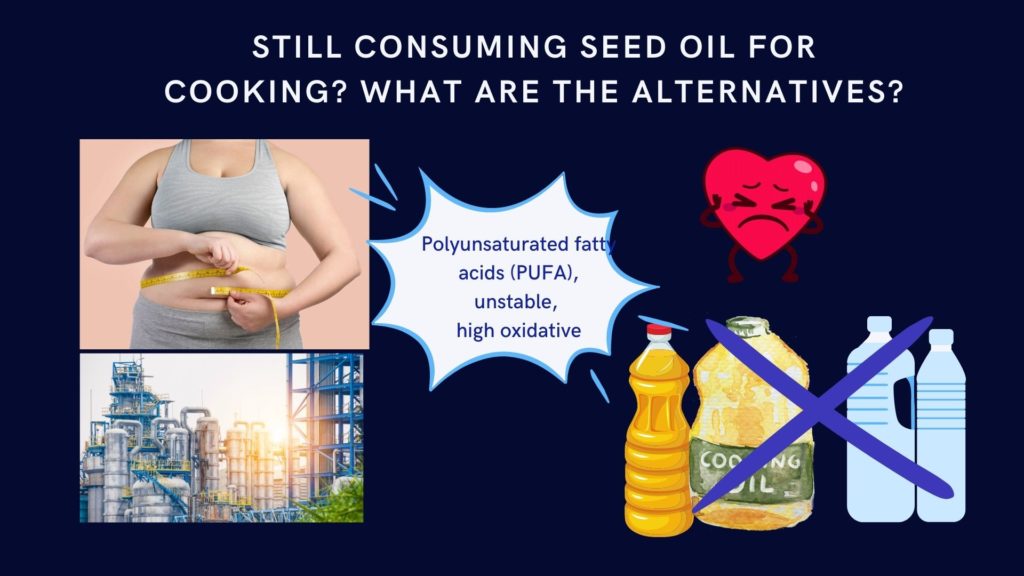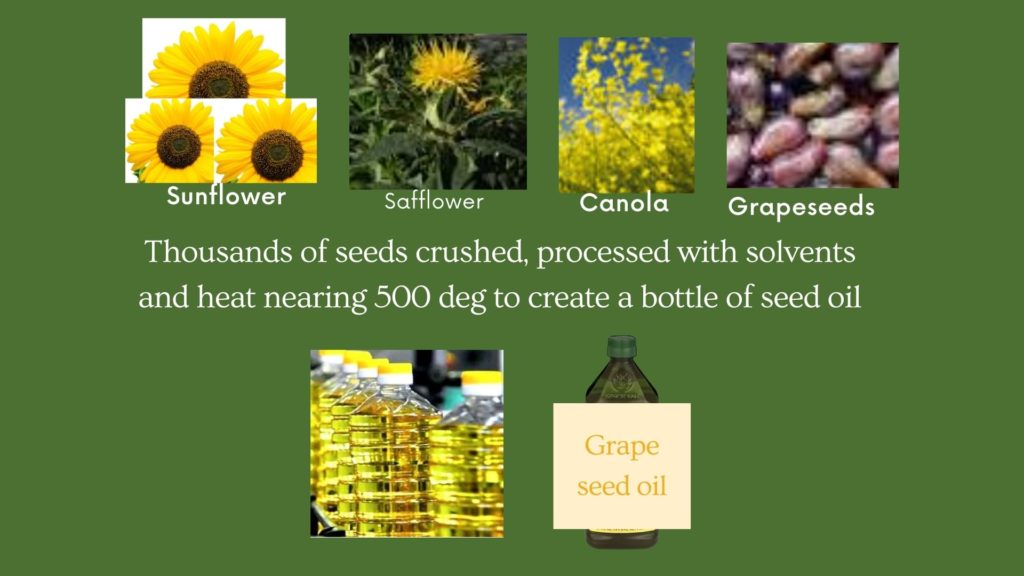What are Seed oils aka Industrial seed oils. And how are they different from Vegetable oils?
Vegetable oils are any oils derived from crops and Plants, including grains, nuts, and seeds.
Industrial seed oils are a sub category of vegetable oils, derived from Seeds. Seed oils are refined from the seeds of crops, using industrial methods like deep crushing, solvents and high heat.
If you look at most ingredient lists on your favorite packaged foods, you’ll likely see at least one type of vegetable oil – from chips to popcorn to granola bars, vegetable oils are everywhere, and overall consumption has increased dramatically over the last 30-40 years.
And with this increase in vegetable oil consumption, chronic diseases like obesity, heart disease, cancer, and diabetes are also on the rise.

What are the most common seed oils. Which one’s have the highest Linoleic acid and could be possibly toxic (especially when used in high temperature cooking)?
Oils having over 70% Linoleic acid:
- Safflower oil
- Sunflower oil
- Grapeseed oil
Oils having over 50% Linoleic acid:
- Soybean oil
- Corn oil
- Cottonseed oil
Oils having > 20% Linoleic acid:
- Canola
- Peanut oil
- Rice bran oil
Although corn, peanuts, and sunflower seeds were part of our whole food diet for ages, but before Industrial seed oils became available, it was not feasible to get such high quantities of linoleic acid through these foods. From 2015 onwards people living in industrialized countries consumed 20% or more of their calories from seed oils, which is a 20 times increase in seed oil consumption
How did we start getting such high quantities Linoleic acid?

Saturated, Unsaturated and Polyunsaturated Fats – What is the difference?
To understand better how seed oils affect our health, let us understand the difference between saturated and unsaturated fats.
Structurally, saturated fats are more stable than unsaturated fats. Saturated fats are saturated with hydrogen atoms, making them solid at room temperature and able to withstand higher heat.
On the other hand, unsaturated fats have one or more double bonds where hydrogen atoms are missing thus making them more unstable and susceptible to oxidation.
When there is more than one double bond, the unsaturated fat is called polyunsaturated fats. The more double bonds, the more susceptible the fat is to oxidation via exposure to air, light, and heat (Ex: omega-3 and omega-6 fatty acid)
Seed oils are particularly rich in the omega-6 fatty acid known as linoleic acid. Higher quantities of linoleic acid from higher seed oil consumption leads to skyrocketing obesity levels and heart disease and other chronic diseases.

Were there any studies/research conducted to understand detrimental impacts of seed oils on our heath?
- A 2004 cell study to understand the effects of T lymphocyte immune cells in linoleic acid, found that linoleic acid caused immunologically harmful effects (ref)
- The same group repeated a similar study in 2006 and found that linoleic acid could kill human lymphocytes due to producing ROS (free radicals), and preventing mitochondria from producing energy(ref)
- In 2021, researchers examined the effects of linoleic acid in retinal cells and found that linoleic acid inhibited the function of human immune cells called dendritic cells and T helper cells, and decreased the functioning of retinal pigment epithelial cells.
- Higher levels of linoleic acid caused increased rates of LDL oxidation, which in longer-term could lead to atherosclerosis.
- A computerized model study found that compared to monounsaturated fatty acids (MUFAs) and saturated fatty acids (SFAs), linoleic acid and other polyunsaturated acids (PUFAs) generated 300% higher levels of carcinogenic polycyclic aromatic hydrocarbons (PAHs), during cooking at high temperature
What harm do seed oils cause over time?
Processed seed oils have high levels of polyunsaturated fats (PUFA):
According to board-certified family physician Cate Shanahan, a healthy person typically has only 2% of polyunsaturated fats in their bodies. Today, however, the numbers are up to 30% due to seed oils and this may lead to inflammations that cause obesity, diabetes, and heart problems.
Seed oils cause an imbalance in the body’s omega-6-to-omega-3 ratio:
The optimal condition for a human body to work its best is when the ratio of omega-6 and omega-3 fatty acids is balanced, said Chris Kresser, co-director of the California Center for Functional Medicine. However, since the processing of seed oils requires many steps and lots of chemicals, this makes them highly rich in omega-6 which causes inflammations and highly contributes to the risk for obesity
Seed oils may worsen coronary heart disease risks:
According to the Sydney Diet Heart Study, linoleic acid, another fatty acid coming from seed oils may cause a higher risk of death in patients with coronary heart disease.
Seed oils are high in trans fats:
Many seed oils also have high levels of trans fats which are linked to heart diseases, cancer, diabetes, and obesity. This is proved based on a source that evaluated vegetable oils found in the United States and found that their trans-fat contents are between 0.56% and 4.2%. According to the American Heart Association, only less than 1% of your fat intake should come from trans fats.
What are our alternatives for avoiding seed oils? How can we live healthier?
Switch to a less-processed cooking oil:
Plant-sourced oils such as olive, coconut, and even avocado are healthier substitutes to seed oils considering these require the minimum processes to acquire and have lower levels of omega-6. But if you’re really into taking things more seriously, stay away from dishes that involve frying or sautéing.

Plan your diet
Aside from actual oils used in frying, seed oils are also found in processed foods such as cookies, candy bars, hummus, or even salad dressing. Thus, if you want to be healthier, scratch these out from your menu and build a diet with whole foods and other healthy fats.
Vegetable oils like avocado, coconut, and olive oil are known for their slightly lower linoleic acid content and decent smoke points.
Conclusion:
Fats and oils are an inevitable part of the human diet since they play a vital part in our metabolism and daily activities. However, there are some fats that pose a threat to our health, and seed oils, for example, are the ones that need to be avoided. And while consuming these in small amounts may have no visible effects, it is far better to avoid them instead since these may accumulate in one’s system and lead to life-threatening conditions in the future.



